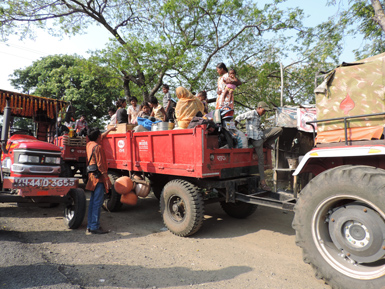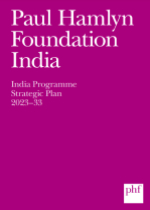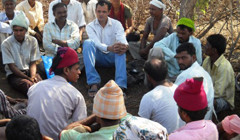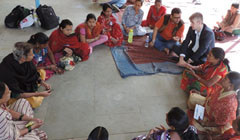GVK and SVS
Rs. 5,279,357 awarded over five years to Gramin Mahila Vikas (GVK)
Rs. 8,776,764 awarded over four years to Samaj Vikas Sanstha (SVS)

The Foundation has been funding GMVS and SVS to address another negative aspect of the seasonal migration of sugar cane cutters, namely violence against women. When labour migrates, men, who make the deals with the contractors, include all family members to increase their income. The social systems in Marathwada permit men to marry more than once and there is often more than one wife in the contract. These contracts are not written down and are only explained orally. Many of them break almost every law of the land.
Women’s work at the sugar cane fields comes on top of taking care of the family. Exploitation of women occurs throughout the time families are at the sugar cane fields, and continues when they are back. On return, the additional wives are ‘released’. Desertion is a common phenomenon in the region. In most villages in Marathwada almost 10 per cent of the population is made up of single women.
Back home with no work through the summer months, men spend a lot of time and money on alcohol. Wife beating and other forms of violence against women tend to rise during this period. GMVS and SVS have identified this as a major focus of their work. PHF has supported both organisations over the past five years to understand, analyse and address the issue.
Through creative mobilisation of women, support through the legal system and the formation of village-level support and vigilance groups, these initiatives have been able to make a difference. GMVS has created ‘zero-tolerance zones’ for gender-based violence. It has also mapped the extent of violence and forms of discrimination against women and adolescent girls, as well as documenting their coping mechanisms. It has engaged with government officials, including the police, protection officers and state-level bureaucrats to understand the underlying causes of violence and develop a plan to overcome it.
SVS has particularly focused on invoking the Protection of Women from Domestic Violence Act, 2005, and providing legal aid to women. Work in 100 villages has shown positive impact. Cases of marital discord, domestic violence, rape and forced child marriages have been reported and registered. The organisation has been using street theatre and other forms of communication to create awareness among communities. It has worked proactively with village-level violence-redress committees to restructure the membership and ensure they act more impartially and judiciously.
Representation of women from all castes and vulnerable groups has been ensured. JVSS, GMVS and SVS have all had enriching experiences from their work in the Marathwada area. With our encouragement, the three organisations have come together to share their experiences, learn from each other and develop a common agenda to address the issue of violence against women. They are also addressing how migration can become less exploitative. The three organisations have created a niche in the region by working closely with the police. They have been given space at the police station for counselling victims and perpetrators.
Staff from the three organisations are now members of committees addressing issues related to gender-based violence, education or marginalised communities in the districts.


